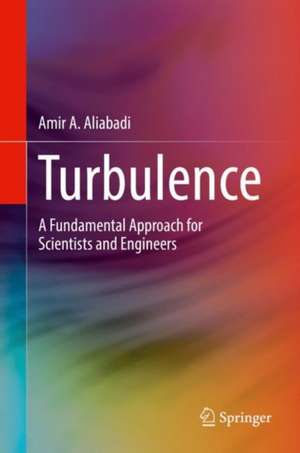Turbulence: A Fundamental Approach for Scientists and Engineers: Mechanical Engineering Series
Autor Amir A. Aliabadien Limba Engleză Hardback – 13 oct 2022
Elucidates the theory behind turbulence in a concise yet rigorous manner
Combines theoretical, computational, experimental, and applied aspects of the topic
Reinforces concepts with practice problems at the end of each chapter
Provides brief chapters on statistics, mathematics, and numerical techniques
| Toate formatele și edițiile | Preț | Express |
|---|---|---|
| Paperback (1) | 389.31 lei 6-8 săpt. | |
| Springer International Publishing – 14 oct 2023 | 389.31 lei 6-8 săpt. | |
| Hardback (1) | 375.61 lei 38-44 zile | |
| Springer International Publishing – 13 oct 2022 | 375.61 lei 38-44 zile |
Din seria Mechanical Engineering Series
-
 Preț: 391.84 lei
Preț: 391.84 lei - 18%
 Preț: 1110.72 lei
Preț: 1110.72 lei - 15%
 Preț: 593.73 lei
Preț: 593.73 lei - 18%
 Preț: 944.99 lei
Preț: 944.99 lei - 15%
 Preț: 653.14 lei
Preț: 653.14 lei - 17%
 Preț: 363.12 lei
Preț: 363.12 lei - 18%
 Preț: 1239.05 lei
Preț: 1239.05 lei - 15%
 Preț: 640.06 lei
Preț: 640.06 lei - 18%
 Preț: 1129.65 lei
Preț: 1129.65 lei - 15%
 Preț: 522.24 lei
Preț: 522.24 lei - 15%
 Preț: 654.77 lei
Preț: 654.77 lei - 15%
 Preț: 643.34 lei
Preț: 643.34 lei - 15%
 Preț: 611.40 lei
Preț: 611.40 lei - 18%
 Preț: 765.96 lei
Preț: 765.96 lei - 20%
 Preț: 631.70 lei
Preț: 631.70 lei - 18%
 Preț: 1009.22 lei
Preț: 1009.22 lei -
 Preț: 418.34 lei
Preț: 418.34 lei - 15%
 Preț: 640.71 lei
Preț: 640.71 lei -
 Preț: 403.53 lei
Preț: 403.53 lei - 18%
 Preț: 813.97 lei
Preț: 813.97 lei - 18%
 Preț: 1386.48 lei
Preț: 1386.48 lei - 18%
 Preț: 951.47 lei
Preț: 951.47 lei - 18%
 Preț: 833.09 lei
Preț: 833.09 lei - 18%
 Preț: 936.60 lei
Preț: 936.60 lei - 15%
 Preț: 644.49 lei
Preț: 644.49 lei - 18%
 Preț: 941.05 lei
Preț: 941.05 lei - 18%
 Preț: 1386.17 lei
Preț: 1386.17 lei -
 Preț: 399.67 lei
Preț: 399.67 lei - 18%
 Preț: 1389.44 lei
Preț: 1389.44 lei - 18%
 Preț: 790.46 lei
Preț: 790.46 lei - 18%
 Preț: 1388.22 lei
Preț: 1388.22 lei - 18%
 Preț: 1024.53 lei
Preț: 1024.53 lei - 15%
 Preț: 590.16 lei
Preț: 590.16 lei - 18%
 Preț: 1234.00 lei
Preț: 1234.00 lei - 18%
 Preț: 1386.62 lei
Preț: 1386.62 lei - 15%
 Preț: 543.85 lei
Preț: 543.85 lei -
 Preț: 391.61 lei
Preț: 391.61 lei - 18%
 Preț: 944.19 lei
Preț: 944.19 lei - 18%
 Preț: 736.16 lei
Preț: 736.16 lei - 18%
 Preț: 943.88 lei
Preț: 943.88 lei - 15%
 Preț: 693.21 lei
Preț: 693.21 lei - 18%
 Preț: 781.77 lei
Preț: 781.77 lei - 15%
 Preț: 639.08 lei
Preț: 639.08 lei - 23%
 Preț: 737.28 lei
Preț: 737.28 lei - 15%
 Preț: 641.53 lei
Preț: 641.53 lei -
 Preț: 401.42 lei
Preț: 401.42 lei
Preț: 375.61 lei
Nou
Puncte Express: 563
Preț estimativ în valută:
71.88€ • 75.29$ • 59.57£
71.88€ • 75.29$ • 59.57£
Carte tipărită la comandă
Livrare economică 04-10 aprilie
Preluare comenzi: 021 569.72.76
Specificații
ISBN-13: 9783030954109
ISBN-10: 3030954102
Pagini: 297
Ilustrații: XVI, 297 p. 85 illus., 30 illus. in color.
Dimensiuni: 155 x 235 x 24 mm
Greutate: 0.61 kg
Ediția:1st ed. 2022
Editura: Springer International Publishing
Colecția Springer
Seria Mechanical Engineering Series
Locul publicării:Cham, Switzerland
ISBN-10: 3030954102
Pagini: 297
Ilustrații: XVI, 297 p. 85 illus., 30 illus. in color.
Dimensiuni: 155 x 235 x 24 mm
Greutate: 0.61 kg
Ediția:1st ed. 2022
Editura: Springer International Publishing
Colecția Springer
Seria Mechanical Engineering Series
Locul publicării:Cham, Switzerland
Cuprins
Introduction .- Equations of Fluid Motion .- Statistical Description of Turbulent Flows .- Mean Flow Equations .- Wall Flows .- Free Shear Flows .- Scales of Turbulent Motion .- Time and Frequency Domains .- Fundamentals of Measurements .- In-situ Techniques .- Sonic and Ultrasonic Techniques .- Electro-magnetic Techniques .- Introduction to Modeling and Simulation .- Turbulent Viscosity Models .- Large-eddy Simulation Models .- Direct Numerical Simulation .- Wall Models .- Model Evaluation .- Engineering .- Sciences .- Statistics .- Mathematics .- Numerical Methods .- Index.
Notă biografică
Dr. Amir A. Aliabadi is an Associate Professor in Environmental Engineering, School of Engineering, University of Guelph, CANADA.
Textul de pe ultima copertă
This textbook explains turbulent flows using an introductory but fundamental approach to teaching the core principles, striking a balance between theoretical and practical aspects of the topic without overwhelming the reader with mathematical detail. It is aimed at students in various engineering disciplines—mechanical, civil, environmental—and the geosciences. It is divided in five parts. Part 1 provides the fundamentals of turbulence, main hypotheses, and analysis tools; Part 2 illustrates various measurement techniques used to study turbulent flows; Part 3 explains the modelling and simulation frameworks to study turbulent flows; Part 4 describes brief applications of turbulence in engineering and sciences; and Part 5 presents basic statistical, mathematical, and numerical tools.
Elucidates the theory behind turbulence in a concise yet rigorous manner;
Combines theoretical, computational, experimental, and applied aspects of the topic;
Reinforces concepts with practice problems at the end of each chapter.
Elucidates the theory behind turbulence in a concise yet rigorous manner;
Combines theoretical, computational, experimental, and applied aspects of the topic;
Reinforces concepts with practice problems at the end of each chapter.
Caracteristici
Elucidates the theory behind turbulence in a concise yet rigorous manner Combines theoretical, computational, experimental, and applied aspects of the topic Reinforces concepts with practice problems at the end of each chapter
